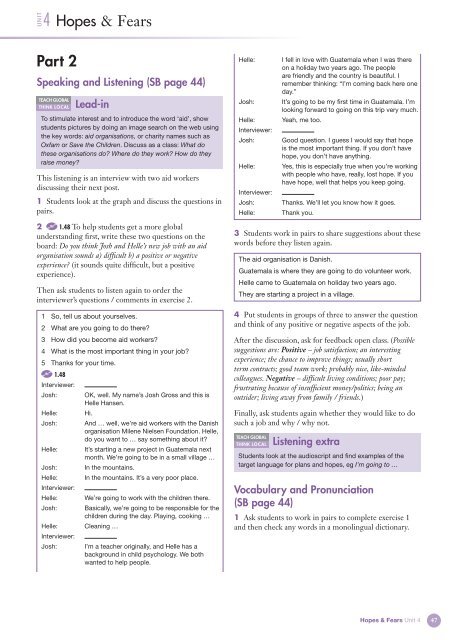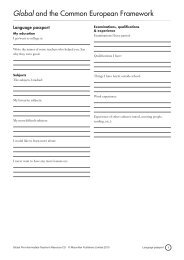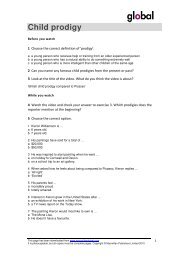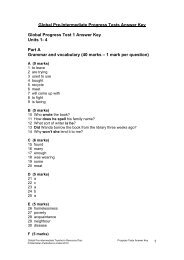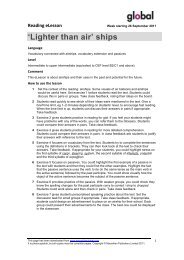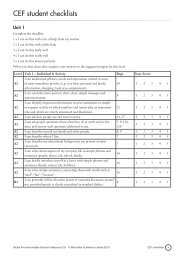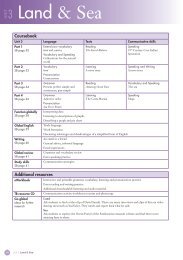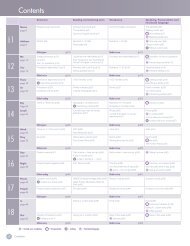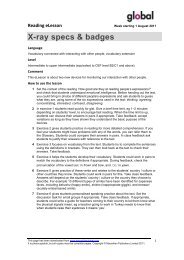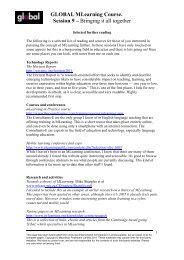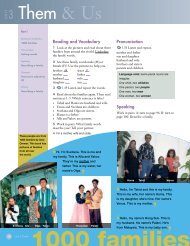Teacher's Book teaching notes - Global
Teacher's Book teaching notes - Global
Teacher's Book teaching notes - Global
You also want an ePaper? Increase the reach of your titles
YUMPU automatically turns print PDFs into web optimized ePapers that Google loves.
UNIT4Hopes & FearsPart 2Speaking and Listening (SB page 44)TEACH globalThink localLead-inTo stimulate interest and to introduce the word ‘aid’, showstudents pictures by doing an image search on the web usingthe key words: aid organisations, or charity names such asOxfam or Save the Children. Discuss as a class: What dothese organisations do? Where do they work? How do theyraise money?This listening is an interview with two aid workersdiscussing their next post.1 Students look at the graph and discuss the questions inpairs.Helle:Josh:Helle:Interviewer:Josh:Helle:Interviewer:Josh:Helle:I fell in love with Guatemala when I was thereon a holiday two years ago. The peopleare friendly and the country is beautiful. Iremember thinking: “I’m coming back here oneday.”It’s going to be my first time in Guatemala. I’mlooking forward to going on this trip very much.Yeah, me too.Good question. I guess I would say that hopeis the most important thing. If you don’t havehope, you don’t have anything.Yes, this is especially true when you’re workingwith people who have, really, lost hope. If youhave hope, well that helps you keep going.Thanks. We’ll let you know how it goes.Thank you.2 1.48 To help students get a more globalunderstanding first, write these two questions on theboard: Do you think Josh and Helle’s new job with an aidorganisation sounds a) difficult b) a positive or negativeexperience? (it sounds quite difficult, but a positiveexperience).Then ask students to listen again to order theinterviewer’s questions / comments in exercise 2.1 So, tell us about yourselves.2 What are you going to do there?3 How did you become aid workers?4 What is the most important thing in your job?5 Thanks for your time.1.48Interviewer:Josh:Helle:Josh:Helle:Josh:Helle:Interviewer:Helle:Josh:Helle:Interviewer:Josh:OK, well. My name’s Josh Gross and this isHelle Hansen.Hi.And … well, we’re aid workers with the Danishorganisation Milene Nielsen Foundation. Helle,do you want to … say something about it?It’s starting a new project in Guatemala nextmonth. We’re going to be in a small village …In the mountains.In the mountains. It’s a very poor place.We’re going to work with the children there.Basically, we’re going to be responsible for thechildren during the day. Playing, cooking …Cleaning …I’m a teacher originally, and Helle has abackground in child psychology. We bothwanted to help people.3 Students work in pairs to share suggestions about thesewords before they listen again.The aid organisation is Danish.Guatemala is where they are going to do volunteer work.Helle came to Guatemala on holiday two years ago.They are starting a project in a village.4 Put students in groups of three to answer the questionand think of any positive or negative aspects of the job.After the discussion, ask for feedback open class. (Possiblesuggestions are: Positive – job satisfaction; an interestingexperience; the chance to improve things; usually shortterm contracts; good team work; probably nice, like-mindedcolleagues. Negative – difficult living conditions; poor pay;frustrating because of insufficient money/politics; being anoutsider; living away from family / friends.)Finally, ask students again whether they would like to dosuch a job and why / why not.TEACH globalThink localListening extraStudents look at the audioscript and find examples of thetarget language for plans and hopes, eg I’m going to …Vocabulary and Pronunciation(SB page 44)1 Ask students to work in pairs to complete exercise 1and then check any words in a monolingual dictionary.Hopes & Fears Unit 4 47


